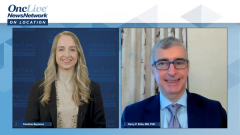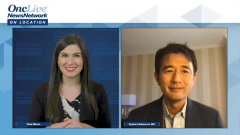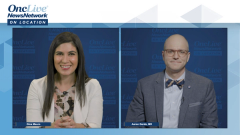
Examining Headway in AML and Multiple Myeloma at ASH 2022: Drs Braunstein and Erba

OncLive® will be LIVE with OncLive® News Network: On Location at the 2022 ASH Annual Meeting. Each day, we will broadcast a series of interviews with top thought leaders, to learn their thoughts and reactions to data presented across hematologic oncology during the conference.
OncLive® will be LIVE with OncLive® News Network: On Location at the 2022 ASH Annual Meeting and Exposition. Each day, we will broadcast a series of interviews with top thought leaders, to learn their thoughts and reactions to data presented across hematologic oncology during the conference.
Today-
We are reporting from the 2022 ASH Annual Meeting and Exposition!
Get ready for highlights of some of the top news presented each day during the meeting—and soon we’ll speak with Drs Marc Braunstein and Harry Erba on some of the novel agents that are generating excitement in multiple myeloma and acute myeloid leukemia treatment.
Welcome to OncLive News Network! I’m Caroline Seymour.
The addition of magrolimab to the combination of azacytidine and venetoclax produced an objective response rate of 80% in older or unfit patients with high-risk, newly diagnosed acute myeloid leukemia. Responses were modest in the relapsed/refractory cohort, and the cohort has been closed for futility.
Preliminary findings from the phase 1/2 KOMET-001 trial demonstrated that ziftomenib, a KMT2A-menin inhibitor induced an objective response rate of 41.7% and minimal residual disease negativity in 60% of patients with relapsed/refractory acute myeloid leukemia at a dose of 600 mg. The compositive complete response rate was 33.3% at this dose level.
Treatment with elranatamab, a BCMA- and CD3-directed bispecific antibody, led to an objective response rate of 64% and a 38% complete response rate in patients with relapsed/refractory multiple myeloma in the phase 1 MagnetisMM-1 trial. All evaluable patients achieved minimal residual disease negativity.
Finally, findings from the phase 3 Myeloma XI trial, which explored whether time-limited maintenance therapy with lenalidomide is as effective as treatment to progression in patients with myeloma, showed improved progression-free survival with continued therapy beyond 3 years but reduced activity between 4 and 5 years, regardless of MRD status. Regarding tolerability, continued lenalidomide maintenance did not cause worsening bone marrow suppression.
Please be sure to check out more of our coverage from the 2022 ASH Annual Meeting and Exposition at OncLive.com.
That’s all for today. Tomorrow, we’ll virtually sit down with Drs Ryotaro Nakamura and Joshua Brody, who will put provocative data in non-Hodgkin lymphoma and graft-versus-host disease in context in both treatment paradigms.
Thank you for watching OncLive News Network: On Location, I’m Caroline Seymour.









































